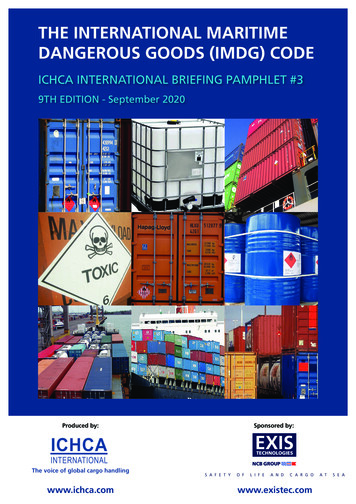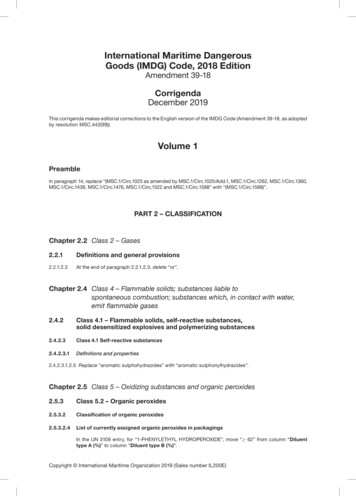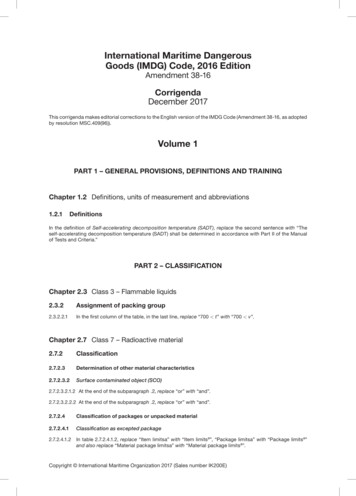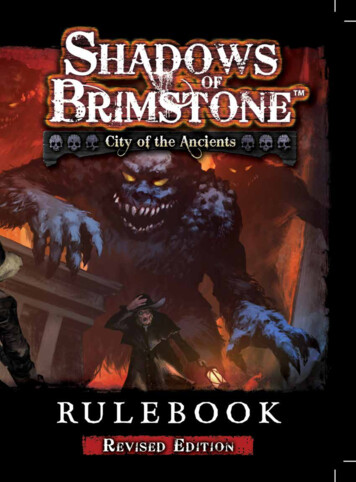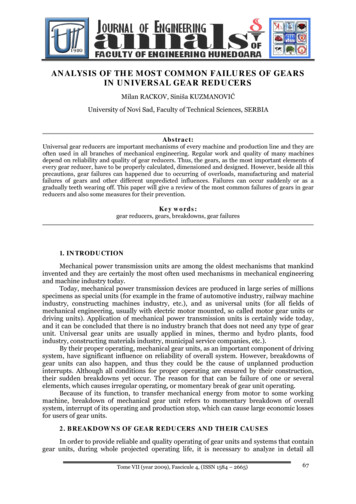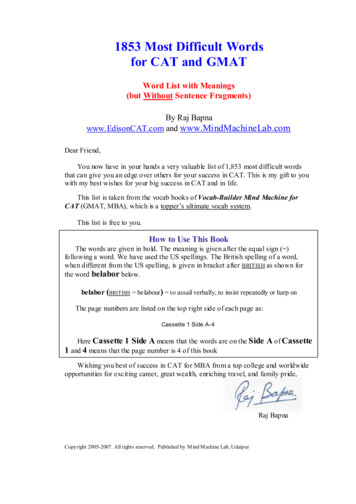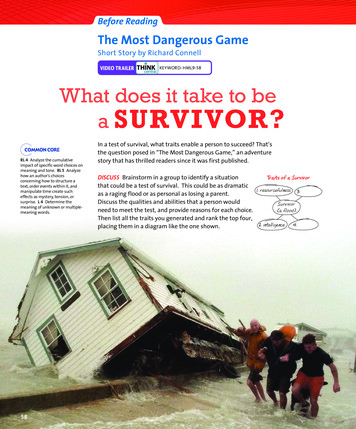
Transcription
Before ReadingThe Most Dangerous GameShort Story by Richard ConnellVIDEO TRAILERKEYWORD: HML9-58What does it take to bea SURVIVOR?RL 4 Analyze the cumulativeimpact of specific word choices onmeaning and tone. RL 5 Analyzehow an author’s choicesconcerning how to structure atext, order events within it, andmanipulate time create sucheffects as mystery, tension, orsurprise. L 4 Determine themeaning of unknown or multiplemeaning words.58In a test of survival, what traits enable a person to succeed? That’sthe question posed in “The Most Dangerous Game,” an adventurestory that has thrilled readers since it was first published.Traits of a SurvivorDISCUSS Brainstorm in a group to identify a situationthat could be a test of survival. This could be as dramatic1. resourcefulness 3.as a raging flood or as personal as losing a parent.Discuss the qualities and abilities that a person wouldSurvivorneed to meet the test, and provide reasons for each choice.(a flood)Then list all the traits you generated and rank the top four,2. intelligence4.placing them in a diagram like the one shown.
Meet the Authortext analysis: conflictIn the rising action of a story, a writer generally introducesone or more conflicts that the main character faces. As therising action unfolds, complications arise that intensify theconflicts and add to the reader’s sense of suspense. Plot events,however, are not always as linear—or directly chronological—asthis model might suggest. Devices such as foreshadowing,flashbacks, and flash-forwards can further heighten thereader’s suspense as the conflict and tension build. As you read“The Most Dangerous Game,” identify the conflicts the maincharacter faces and note any complications that arise.reading strategy: visualizeGood readers constantly visualize, or use details in a story toform sensory images of the settings, characters, and events.In this story, for example, Connell’s specific word choices helpcreate an image of a dangerous island where strange thingshappen. As you read, practice the strategy of visualizing. Usea chart like the one shown to record story details that formsensory images for you.Details from StoryWhat I VisualizeDank tropical night . . . thickwarm blacknessThe dark, heavy air is almostlike a blanket.Richard Connell1893–1949A Writing LifeEven as a young boy, Richard Connell lovedto write. When he was only 10 years old,he covered baseball games for his father’sdaily newspaper in Poughkeepsie, New York.By 16, Connell was city editor for the samenewspaper. After graduating from Harvardand serving in World War I, Connell wrotemore than 300 short stories, as well as novelsand screenplays. Many of his short storiesbecame successful films. Connell’s successenabled him to travel the world and thensettle comfortably in Beverly Hills, California,on the opposite side of the country from hisprevious hometown of Poughkeepsie.One-Story LegacyAlthough Connell became a prosperouswriter during his lifetime, only one of hisstories—“The Most Dangerous Game”—iswidely read today. It won the O. HenryMemorial Prize in 1924. Because of its actionpacked and suspenseful plot, it remains apopular and frequently anthologized work.background to the storyReview: Predictvocabulary in contextUse the context to help you figure out the meaning of eachboldfaced word below.1. real and tangible7. a droll, self-mocking grin2. the hunter’s quarry8. felt no scruples aboutbreaking traffic laws3. put at ease by hisdisarming smile4. a charming,cultivated woman5. a cruise ship offeringevery amenity6. condone ratherthan condemnBig-Game HuntingHunting for big game, such as lions, rhinos,and leopards, was a popular sport amongwealthy people in the early 20th century.These people had time and money to spendon travel and on satisfying their thirst forconquest, danger, and excitement. The twomain characters in “The Most DangerousGame” are experienced hunters in search of agreater challenge.9. asked solicitously aboutmy health10. recommended butnot imperative11. zealous support of themayor’s programAuthorOnline12. an uncanny coincidenceGo to thinkcentral.com.thinKEYWORD: HML9-59KEYWORDComplete the activities in your Reader/Writer Notebook.59
The MostDangerousGameRichard Connell1020“Off there to the right—somewhere—is a large island,” said Whitney. “It’srather a mystery—”“What island is it?” Rainsford asked.“The old charts call it ‘Ship-Trap Island,’” Whitney replied. “A suggestivename, isn’t it? Sailors have a curious dread of the place. I don’t know why.Some superstition—”“Can’t see it,” remarked Rainsford, trying to peer through the dank tropicalnight that was palpable as it pressed its thick warm blackness in upon the yacht.“You’ve good eyes,” said Whitney, with a laugh, “and I’ve seen you pick off amoose moving in the brown fall bush at four hundred yards, but even you can’tsee four miles or so through a moonless Caribbean night.”“Nor four yards,” admitted Rainsford. “Ugh! It’s like moist black velvet.”“It will be light enough in Rio,”1 promised Whitney. “We should make it ina few days. I hope the jaguar guns have come from Purdey’s. We should havesome good hunting up the Amazon. Great sport, hunting.”“The best sport in the world,” agreed Rainsford.“For the hunter,” amended Whitney. “Not for the jaguar.”“Don’t talk rot, Whitney,” said Rainsford. “You’re a big-game hunter, not aphilosopher. Who cares how a jaguar feels?”“Perhaps the jaguar does,” observed Whitney.“Bah! They’ve no understanding.” a1. Rio: Rio de Janeiro (rCPI dA zhE-nârPI), a city on the coast of Brazil.60unit 1: narrative structureWhat mood does thephoto stir in you? Decidewhich details work toevoke this feeling.aCONFLICTReread lines 16–21. Whatcan you conclude aboutRainsford from hisconflict with Whitney?
30405060“Even so, I rather think they understand one thing—fear. The fear of painand the fear of death.”“Nonsense,” laughed Rainsford. “This hot weather is making you soft,Whitney. Be a realist. The world is made up of two classes—the hunters andthe huntees. Luckily, you and I are hunters. Do you think we’ve passed thatisland yet?’’“I can’t tell in the dark. I hope so.”“Why?” asked Rainsford.“The place has a reputation—a bad one.”“Cannibals?” suggested Rainsford.“Hardly. Even cannibals wouldn’t live in such a Godforsaken place. Butit’s gotten into sailor lore, somehow. Didn’t you notice that the crew’s nervesseemed a bit jumpy today?”“They were a bit strange, now you mention it. Even Captain Nielsen—”“Yes, even that tough-minded old Swede, who’d go up to the devilhimself and ask him for a light. Those fishy blue eyes held a look I never sawthere before. All I could get out of him was: ‘This place has an evil nameamong seafaring men, sir.’ Then he said to me, very gravely: ‘Don’t you feelanything?’—as if the air about us was actually poisonous. Now, you mustn’tlaugh when I tell you this—I did feel something like a sudden chill. b“There was no breeze. The sea was as flat as a plate-glass window. We weredrawing near the island then. What I felt was a—a mental chill; a sort ofsudden dread.”“Pure imagination,” said Rainsford. “One superstitious sailor can taint thewhole ship’s company with his fear.”“Maybe. But sometimes I think sailors have an extra sense that tells themwhen they are in danger. Sometimes I think evil is a tangible thing—withwavelengths, just as sound and light have. An evil place can, so to speak,broadcast vibrations of evil. Anyhow, I’m glad we’re getting out of this zone.Well, I think I’ll turn in now, Rainsford.”“I’m not sleepy,” said Rainsford. “I’m going to smoke another pipe up onthe afterdeck.”“Good night, then, Rainsford. See you at breakfast.”“Right. Good night, Whitney.”There was no sound in the night as Rainsford sat there but the muffledthrob of the engine that drove the yacht swiftly through the darkness, and theswish and ripple of the wash of the propeller.Rainsford, reclining in a steamer chair, indolently puffed on his favoritebrier.2 The sensuous drowsiness of the night was on him. “It’s so dark,” hethought, “that I could sleep without closing my eyes; the night would be myeyelids—” c2. brier (brFPEr): a tobacco pipe.62unit 1: narrative structurebPREDICTReread lines 30–41.Notice that even a hardboiled sailor is fearful ofthe island. What do youpredict might happen onthe island?tangible (tBnPjE-bEl) adj.capable of being touchedor felt; having actual formand substancecVISUALIZEReread lines 59–62, tryingto visualize Rainsford.What does the author’sdescription tell you aboutRainsford’s mood?
708090100An abrupt sound startled him. Off to the right he heard it, and his ears,expert in such matters, could not be mistaken. Again he heard the sound, andagain. Somewhere, off in the blackness, someone had fired a gun three times.Rainsford sprang up and moved quickly to the rail, mystified. He strainedhis eyes in the direction from which the reports had come, but it was liketrying to see through a blanket. He leaped upon the rail and balanced himselfthere, to get greater elevation; his pipe, striking a rope, was knocked from hismouth. He lunged for it; a short, hoarse cry came from his lips as he realizedhe had reached too far and had lost his balance. The cry was pinched off shortas the blood-warm waters of the Caribbean Sea closed over his head.He struggled up to the surface and tried to cry out, but the wash from thespeeding yacht slapped him in the face, and the salt water in his open mouthmade him gag and strangle. Desperately he struck out with strong strokesafter the receding lights of the yacht, but he stopped before he had swum fiftyfeet. A certain cool-headedness had come to him; it was not the first time hehad been in a tight place. There was a chance that his cries could be heard bysomeone aboard the yacht, but that chance was slender and grew more slenderas the yacht raced on. He wrestled himself out of his clothes and shouted withall his power. The lights of the yacht became faint and ever-vanishing fireflies;then they were blotted out entirely by the night. dRainsford remembered the shots. They had come from the right, anddoggedly he swam in that direction, swimming with slow, deliberate strokes,conserving his strength. For a seemingly endless time he fought the sea. Hebegan to count his strokes; he could do possibly a hundred more and then—Rainsford heard a sound. It came out of the darkness, a high, screamingsound, the sound of an animal in an extremity of anguish and terror.He did not recognize the animal that made the sound; he did not try to;with fresh vitality he swam toward the sound. He heard it again; then it wascut short by another noise, crisp, staccato.“Pistol shot,” muttered Rainsford, swimming on.Ten minutes of determined effort brought another sound to his ears—themost welcome he had ever heard—the muttering and growling of the seabreaking on a rocky shore. He was almost on the rocks before he saw them;on a night less calm he would have been shattered against them. With hisremaining strength he dragged himself from the swirling waters. Jagged cragsappeared to jut up into the opaqueness; he forced himself upward, hand overhand. Gasping, his hands raw, he reached a flat place at the top. Dense junglecame down to the very edge of the cliffs. What perils that tangle of trees andunderbrush might hold for him did not concern Rainsford just then. All heknew was that he was safe from his enemy, the sea, and that utter wearinesswas on him. He flung himself down at the jungle edge and tumbled headlonginto the deepest sleep of his life. edCONFLICTHere the author buildstension by introducinga complication. What doyou think will happennext?L4Language CoachMultiple MeaningWords Many Englishwords are multiplemeaning words—wordswith more than onemeaning. What is themeaning of the wordextremity in line 88? a limb on a body the farthest point extreme dangereVISUALIZEReread lines 93–104.Which details in thispassage help youvisualize the scene?the most dangerous game63
11012013014064When he opened his eyes, he knew from the position of the sun that itwas late in the afternoon. Sleep had given him new vigor; a sharp hunger waspicking at him. He looked about him, almost cheerfully.“Where there are pistol shots, there are men. Where there are men, thereis food,” he thought. But what kind of men, he wondered, in so forbidding aplace? An unbroken front of snarled and ragged jungle fringed the shore. fHe saw no sign of a trail through the closely knit web of weeds and trees; itwas easier to go along the shore, and Rainsford floundered along by the water.Not far from where he had landed, he stopped.Some wounded thing, by the evidence a large animal, had thrashed aboutin the underbrush; the jungle weeds were crushed down, and the moss waslacerated; one patch of weeds was stained crimson. A small, glittering objectnot far away caught Rainsford’s eye, and he picked it up. It was an emptycartridge.“A twenty-two,” he remarked. “That’s odd. It must have been a fairly largeanimal, too. The hunter had his nerve with him to tackle it with a light gun.It’s clear that the brute put up a fight. I suppose the first three shots I heardwas when the hunter flushed his quarry and wounded it. The last shot waswhen he trailed it here and finished it.”He examined the ground closely and found what he had hoped to find—theprint of hunting boots. They pointed along the cliff in the direction he hadbeen going. Eagerly he hurried along, now slipping on a rotten log or a loosestone, but making headway; night was beginning to settle down on theisland.Bleak darkness was blacking out the sea and jungle when Rainsford sightedthe lights. He came upon them as he turned a crook in the coastline, and hisfirst thought was that he had come upon a village, for there were many lights.But as he forged along, he saw to his great astonishment that all the lights werein one enormous building—a lofty structure with pointed towers plungingupward into the gloom. His eyes made out the shadowy outlines of a palatialchâteau; it was set on a high bluff, and on three sides of it cliffs dived down towhere the sea licked greedy lips in the shadows.“Mirage,” thought Rainsford. But it was no mirage, he found, when heopened the tall spiked iron gate. The stone steps were real enough; the massivedoor with a leering gargoyle for a knocker was real enough; yet about it allhung an air of unreality. gHe lifted the knocker, and it creaked up stiffly as if it had never before beenused. He let it fall, and it startled him with its booming loudness. He thoughthe heard steps within; the door remained closed. Again Rainsford lifted theheavy knocker and let it fall. The door opened then, opened as suddenly as if itwere on a spring, and Rainsford stood blinking in the river of glaring gold lightthat poured out. The first thing Rainsford’s eyes discerned was the largest manunit 1: narrative structurefPREDICTAnswer Rainsford’squestion. What kindof men do you thinkRainsford will encounteron the island?quarry (kwôrPC) n. theobject of a hunt; preygVISUALIZEReread lines 129–140.What sensory imagecomes to mind when youthink of the chateau?Does it seem like a warmand welcoming place?Explain.
Castle at Noon, William Low. William Low.150160Rainsford had ever seen—a gigantic creature, solidly made and black-beardedto the waist. In his hand the man held a long-barreled revolver, and he waspointing it straight at Rainsford’s heart.Out of the snarl of beard two small eyes regarded Rainsford.“Don’t be alarmed,” said Rainsford, with a smile which he hoped wasdisarming. “I’m no robber. I fell off a yacht. My name is Sanger Rainsford ofNew York City.”The menacing look in the eyes did not change. The revolver pointedas rigidly as if the giant were a statue. He gave no sign that he understoodRainsford’s words, or that he had even heard them. He was dressed in uniform,a black uniform trimmed with gray astrakhan.3“I’m Sanger Rainsford of New York,” Rainsford began again. “I fell off ayacht. I am hungry.”The man’s only answer was to raise with his thumb the hammer of hisrevolver. Then Rainsford saw the man’s free hand go to his forehead in amilitary salute, and he saw him click his heels together and stand at attention.Another man was coming down the broad marble steps, an erect, slender manin evening clothes. He advanced to Rainsford and held out his hand.In a cultivated voice marked by a slight accent that gave it added precisionand deliberateness, he said: “It is a very great pleasure and honor to welcomeMr. Sanger Rainsford, the celebrated hunter, to my home.”disarming (dGs-ärPmGng)adj. removing orovercomingsuspicion; inspiringconfidencecultivated (kOlPtE-vAQtGd)adj. refined or culturedin manner3. astrakhan (BsPtrE-kBnQ): a fur made from the curly, wavy wool of young lambs from Astrakhan(a city of southwest Russia).the most dangerous game65
170180190200Automatically Rainsford shookthe man’s hand.“I’ve read your book abouthunting snow leopards in Tibet,4you see,” explained the man. “I amGeneral Zaroff.”Rainsford’s first impressionwas that the man was singularlyhandsome; his second was thatthere was an original, almost bizarrequality about the general’s face.He was a tall man past middle age,for his hair was a vivid white; buthis thick eyebrows and pointedmilitary moustache were as blackas the night from which Rainsfordhad come. His eyes, too, wereblack and very bright. He had highcheekbones, a sharp-cut nose, aspare, dark face, the face of a manused to giving orders, the face ofan aristocrat. Turning to the giantin uniform, the general made asign. The giant put away his pistol,saluted, withdrew.“Ivan is an incredibly strongfellow,” remarked the general, “buthe has the misfortune to be deafand dumb. A simple fellow, but,I’m afraid, like all his race, a bit of asavage.”“Is he Russian?”“He is a Cossack,”5 said thegeneral, and his smile showed red lips and pointed teeth. “So am I.“Come,” he said, “we shouldn’t be chatting here. We can talk later. Now youwant clothes, food, rest. You shall have them. This is a most restful spot.”Ivan had reappeared, and the general spoke to him with lips that moved butgave forth no sound.“Follow Ivan, if you please, Mr. Rainsford,” said the general. “I was about tohave my dinner when you came. I’ll wait for you. You’ll find that my clotheswill fit you, I think.”4. Tibet (tE-bDtP): a region in central Asia.5. Cossack (kJsPBk): a member of a southern Russian people, many of whom served as fierce cavalrymenunder the Russian tsars.66unit 1: narrative structure
210220230240250It was to a huge, beam-ceilinged bedroom with a canopied bed big enoughfor six men that Rainsford followed the silent giant. Ivan laid out an eveningsuit, and Rainsford, as he put it on, noticed that it came from a London tailorwho ordinarily cut and sewed for none below the rank of duke.The dining room to which Ivan conducted him was in many waysremarkable. There was a medieval magnificence about it; it suggested abaronial hall of feudal times with its oaken panels, its high ceiling, its vastrefectory table where two score men could sit down to eat. About the hall werethe mounted heads of many animals—lions, tigers, elephants, moose, bears;larger or more perfect specimens Rainsford had never seen. At the great tablethe general was sitting, alone.“You’ll have a cocktail, Mr. Rainsford,” he suggested. The cocktail wassurpassingly good; and, Rainsford noted, the table appointments were of thefinest—the linen, the crystal, the silver, the china.They were eating borsch, the rich red soup with whipped cream so dear toRussian palates. Half apologetically General Zaroff said: “We do our best topreserve the amenities of civilization here. Please forgive any lapses. We arewell off the beaten track, you know. Do you think the champagne has sufferedfrom its long ocean trip?”“Not in the least,” declared Rainsford. He was finding the general a mostthoughtful and affable host, a true cosmopolite.6 But there was one small traitof the general’s that made Rainsford uncomfortable. Whenever he looked upfrom his plate, he found the general studying him, appraising him narrowly.“Perhaps,” said General Zaroff, “you were surprised that I recognized yourname. You see, I read all books on hunting published in English, French, andRussian. I have but one passion in my life, Mr. Rainsford, and it is the hunt.”“You have some wonderful heads here,” said Rainsford as he ate aparticularly well cooked filet mignon. “That Cape buffalo is the largest Iever saw.”“Oh, that fellow. Yes, he was a monster.”“Did he charge you?”“Hurled me against a tree,” said the general. “Fractured my skull. But I gotthe brute.”“I’ve always thought,” said Rainsford, “that the Cape buffalo is the mostdangerous of all big game.”For a moment the general did not reply; he was smiling his curious redlipped smile. Then he said slowly: “No. You are wrong, sir. The Cape buffalo isnot the most dangerous big game.” He sipped his wine. “Here in my preserveon this island,” he said, in the same slow tone, “I hunt more dangerous game.”Rainsford expressed his surprise. “Is there big game on this island?”The general nodded. “The biggest.”“Really?”“Oh, it isn’t here naturally, of course. I have to stock the island.”amenity (E-mDnPG-tC)n. something that addsto one’s comfort orconvenience6. cosmopolite (kJz-mJpPE-lFtQ): a sophisticated person who can handle any situation well.the most dangerous game67
260270280“What have you imported, General?” Rainsford asked. “Tigers?”The general smiled. “No,” he said. “Hunting tigers ceased to interest mesome years ago. I exhausted their possibilities, you see. No thrill left in tigers,no real danger. I live for danger, Mr. Rainsford.”The general took from his pocket a gold cigarette case and offered his guesta long black cigarette with a silver tip; it was perfumed and gave off a smelllike incense.“We will have some capital hunting, you and I,” said the general. “I shall bemost glad to have your society.”“But what game—” began Rainsford.“I’ll tell you,” said the general. “You will be amused, I know. I think Imay say, in all modesty, that I have done a rare thing. I have invented a newsensation. May I pour you another glass of port, Mr. Rainsford?”“Thank you, General.” hThe general filled both glasses and said: “God makes some men poets. Somehe makes kings, some beggars. Me he made a hunter. My hand was made forthe trigger, my father said. He was a very rich man with a quarter of a millionacres in the Crimea, and he was an ardent sportsman. When I was only fiveyears old, he gave me a little gun, specially made in Moscow for me, to shootsparrows with. When I shot some of his prize turkeys with it, he did notpunish me; he complimented me on my marksmanship. I killed my first bearin the Caucasus7 when I was ten. My whole life has been one prolonged hunt.I went into the army—it was expected of noblemen’s sons—and for a timecommanded a division of Cossack cavalry, but my real interest was always thehunt. I have hunted every kind of game in every land. It would be impossiblefor me to tell you how many animals I have killed.”The general puffed at his cigarette.“After the debacle in Russia I left the country, for it was imprudent foran officer of the Tsar8 to stay there. Many noble Russians lost everything. I,luckily, had invested heavily in American securities, so I shall never have toopen a tearoom in Monte Carlo or drive a taxi in Paris. Naturally, I continuedto hunt—grizzlies in your Rockies, crocodiles in the Ganges,9 rhinoceroses inEast Africa. It was in Africa that the Cape buffalo hit me and laid me up forsix months. As soon as I recovered, I started for the Amazon to hunt jaguars,for I had heard they were unusually cunning. They weren’t.” The Cossacksighed. “They were no match at all for a hunter with his wits about him, anda high-powered rifle. I was bitterly disappointed. I was lying in my tent with asplitting headache one night when a terrible thought pushed its way into my7. Crimea (krF-mCPE) . . . Caucasus (kôPkE-sEs): regions in the southern part of the former Russian Empire,near the Black Sea.8. debacle in Russia . . . Tsar (zär): a reference to the 1917 Russian Revolution, in which the emperor, TsarNicholas II, was violently overthrown.9. Ganges (gBnPjCzQ): a river in northern India.68unit 1: narrative structurehCONFLICTReread lines 228–265.The conversationbetween Rainsford andZaroff hints at furtherplot complications. Useclues to predict futureevents.L 4bLanguage CoachSuffixes Adding a suffixto a word creates a newword. To determinemeaning, separate theword’s root and suffix.Marksmanship (line272) can be divided as:marksman/ship. Here,the suffix -ship indicatesskill. What doesmarksmanship mean?
290300310320330mind. Hunting was beginning to bore me! And hunting, remember, had beenmy life. I have heard that in America businessmen often go to pieces whenthey give up the business that has been their life.”“Yes, that’s so,” said Rainsford. iThe general smiled. “I had no wish to go to pieces,” he said. “I must dosomething. Now, mine is an analytical mind, Mr. Rainsford. Doubtless that iswhy I enjoy the problems of the chase.”“No doubt, General Zaroff.”“So,” continued the general, “I asked myself why the hunt no longerfascinated me. You are much younger than I am, Mr. Rainsford, and have nothunted as much, but you perhaps can guess the answer.”“What was it?”“Simply this: hunting had ceased to be what you call ‘a sporting proposition.’It had become too easy. I always got my quarry. Always. There is no greaterbore than perfection.”The general lit a fresh cigarette.“No animal had a chance with me any more. That is no boast; it is amathematical certainty. The animal had nothing but his legs and his instinct.Instinct is no match for reason. When I thought of this, it was a tragicmoment for me, I can tell you.”Rainsford leaned across the table, absorbed in what his host was saying.“It came to me as an inspiration what I must do,” the general went on.“And that was?”The general smiled the quiet smile of one who has faced an obstacle andsurmounted it with success. “I had to invent a new animal to hunt,” he said. j“A new animal? You’re joking.”“Not at all,” said the general. “I never joke about hunting. I needed a newanimal. I found one. So I bought this island, built this house, and here I do myhunting. The island is perfect for my purposes—there are jungles with a mazeof trails in them, hills, swamps—”“But the animal, General Zaroff?”“Oh,” said the general, “it supplies me with the most exciting hunting inthe world. No other hunting compares with it for an instant. Every day I hunt,and I never grow bored now, for I have a quarry with which I can match mywits.”Rainsford’s bewilderment showed in his face.“I wanted the ideal animal to hunt,” explained the general. “So I said:‘What are the attributes of an ideal quarry?’ And the answer was, of course: ‘Itmust have courage, cunning, and, above all, it must be able to reason.’”“But no animal can reason,” objected Rainsford.“My dear fellow,” said the general, “there is one that can.”“But you can’t mean—” gasped Rainsford.“And why not?”“I can’t believe you are serious, General Zaroff. This is a grisly joke.”iVISUALIZEAs you read the rest ofthis page, visualize theexpression on Rainsford’sface as he listens toGeneral Zaroff. How doeshis expression changeover the course of theconversation?RL 5jPLOT DEVICESForeshadowing is whenan author gives cluesabout what mighthappen next in the story.It increases suspense andmakes the reader eagerto read on and resolvethe mystery. Look backover the last few pagesof “The Most DangerousGame.” What clues doesthe author give you aboutwhat animal GeneralZaroff likes to hunt? Whatdo you think that animalis? Support your answerwith evidence.the most dangerous game69
340350360370“Why should I not be serious? I am speaking of hunting.”“Hunting? Good God, General Zaroff, what you speak of is murder.”The general laughed with entire good nature. He regarded Rainsfordquizzically. “I refuse to believe that so modern and civilized a young man asyou seem to be harbors romantic ideas about the value of human life. Surelyyour experiences in the war—”“Did not make me condone cold-blooded murder,” finished Rainsford,stiffly.Laughter shook the general. “How extraordinarily droll you are!” he said.“One does not expect nowadays to find a young man of the educated class,even in America, with such a naïve, and, if I may say so, mid-Victorian pointof view. It’s like finding a snuffbox in a limousine. Ah, well, doubtless you hadPuritan ancestors. So many Americans appear to have had. I’ll wager you’llforget your notions when you go hunting with me. You’ve a genuine new thrillin store for you, Mr. Rainsford.”“Thank you, I’m a hunter, not a murderer.”“Dear me,” said the general, quite unruffled, “again that unpleasant word.But I think I can show you that your scruples are quite ill-founded.”“Yes?”“Life is for the strong, to be lived by the strong, and, if needs be, taken bythe strong. The weak of the world were put here to give the strong pleasure.I am strong. Why should I not use my gift? If I wish to hunt, why should Inot? I hunt the scum of the earth—sailors from tramp ships—lascars,10 blacks,Chinese, whites, mongrels—a thoroughbred horse or hound is worth morethan a score of them.”“But they are men,” said Rainsford, hotly.“Precisely,” said the general. “That is why I use them. It gives me pleasure.They can reason, after a fashion. So they are dangerous.”“But where do you get them?”The general’s left eyelid fluttered down in a wink. “This island is called ShipTrap,” he answered. “Sometimes an angry god of the high seas sends them tome. Sometimes, when Providence is not so kind, I help Providence a bit. Cometo the window with me.”Rainsford went to the window and looked out toward the sea.“Watch! Out there!” exclaimed the general, pointing into the night.Rainsford’s eyes saw only
whole ship’s company with his fear.” “Maybe. But sometimes I think sailors have an extra sense that tells them when they are in danger. Sometimes I think evil is a tangible thing—with wavelengths, just as sound and light have. An evil place can, so to speak, broadcast vibrations

